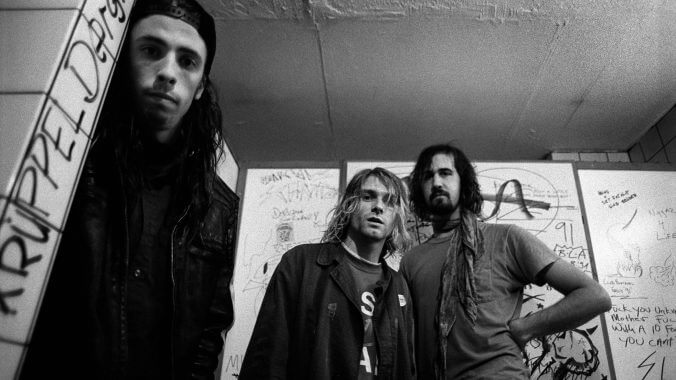The 30 Greatest Nirvana Songs
Photo by Paul Bergen/Redferns
30 years ago this week, Seattle alt-rock titans Nirvana—Kurt Cobain, Dave Grohl and Krist Novoselic—unveiled In Utero, their final studio album as a band. It became one of the most important records of the year and of the decade and, by April of 1994, Cobain would be dead and Nirvana would be no more. Between 1989 and 1994, they put out three studio records, recorded the greatest MTV Unplugged set ever, cast a large spotlight of importance over the Pacific Northwest music scene and, in the largest sense, turned the world on its head and created one of the sharpest, most important eras in all of rock ‘n’ roll.
Nirvana became huge when “Smells Like Teen Spirit” was christened as the song of a generation, the definitive document of the 1990s—we know this much. They ushered in the grunge movement—alongside bands like Pearl Jam, Soundgarden, Mudhoney, The Melvins and others—and, in the wake of Cobain’s passing, have endured in an almost mythical way. You’ve likely owned a smiley-face T-shirt at some point in your life, or you’ve read Cobain’s suicide note. You’ve probably made a joke about the baby on the cover of Nevermind, or you’ve gotten really stoked on the Meat Puppets because of their proxy with Nirvana. Few rock bands in the history of modern music have outlived their own catalog like Nirvana—maybe only topped by The Beatles, at least in a commercial, consumerist sense.
It’s hard to make sense of the landscape of music as we know it in 2023 without first giving thanks to Cobain, Grohl and Novoselic and their contributions. They made rigid, punk-infused rock built on pop architecture and glossed with a noisey, brash shine. To honor the trio, we’ve combed through their discography—studio albums, demos, live records, EPs and all—and picked out the entries we feel are their very best. So, without further ado, here are the 30 greatest Nirvana songs, ranked. —Matt Mitchell, Music Editor
30. “Breed” (Nevermind, 1991)
The quickest three-minute song to ever exist, “Breed” is just dumb, fun and catchy. Originally titled “Imodium” after the anti-diarrhea medicine Tad Doyle was using on TAD and Nirvana’s joint European tour in 1989, “Breed” is glam-stoked punk rock with pop choruses. “I don’t mean to stare, we don’t have to breed,” Cobain sings. “We could build a house, we could plant a tree.” The lyrics are among the frontman’s simplest—but the focus on tracks like “Breed” and other Bleach-era tracks was to get loud and melodic. The verses would come later. Given the greatness of Nevermind, even a track like “Breed”—a composition rid of star-power—lands on two feet. —Matt Mitchell
29. “Very Ape” (In Utero, 1993)
Working away from its original title “Perky New Wave Number,” “Very Ape” appears on In Utero as an exercise in punk surrealism. With its slight forward syncopation, whirring guitar backing and lyrics like “I’m the king of illiterature,” and “Out of the ground, into the sky. Out of the sky, into the dirt,” it is impossible to not become absolutely disoriented when listening. Steve albini’s tight, meticulous production holds all the parts together in precise frequency, giving Cobain all the room he could possibly need to fully let loose. —Madelyn Dawson
28. “On a Plain” (Nevermind, 1991)
While I prefer the Unplugged rendition, it’s hard to ignore how melodic and perfect “On a Plain” was and still is. It was written in 1990 after Bleach had come out, recorded in Seattle a year later during Dave Grohl’s first session with the band and then re-recorded a year later with Butch Vig at Sound City in Van Nuys. While Cobain felt like the song came out “too clean,” there’s so much to love about “On a Plain”—especially the “love myself better than you” lyric that rings in with searing catchiness. Much of Nevermind balanced mainstream chords with waves of immense, terrifying distortion—but “On a Plain” cuts through the noise with infectious poptimism and a punk rock gloss. —MM
27. “Molly’s Lips” (Incesticide, 1992)
Written by the Vaselines and made famous by Nirvana, “Molly’s Lips” was the band’s most retro entry across their whole catalog—and Cobain sings the track like a punk band playing a sock-hop dance. The version of the track we get on Incesticide was recorded with John Peel during Dave Grohl’s first session with the band. It’s uptempo and keeps in line with Nirvana’s alt-rock blueprint, yet it maintains a candy-coated gloss to it—cementing its legacy as one of the uniquest compositions ever. Cobain never liked his version of the track very much, but I’d argue it’s Nirvana on a level they rarely let anyone else hear them get to. —MM
26. “About a Girl” (Bleach, 1989)
A wistful ballad from the pre-Dave Grohl era, “About A Girl” charted as a single five years after its initial release on Bleach—thanks to the band’s MTV Unplugged album in 1994. Arguably, it’s Bleach’s most accessible song for its ‘60s pop melody, and a standout against the grit of the rest of the album. The girl in question is one of Cobain’s less infamous girlfriends—Tracy Marander—and recounts their volatile relationship. Domestic spats about cleaning and financial problems are painted as a toxic affair and are artfully condensed into the chorus, “I’ll take advantage while you hang me out to dry.” Bleach’s third track may not be as heavy as other standouts from the 1989 album, but Cobain’s classic, scratchy vocal keeps it as grunge as ever. Taking such a risk with a more mainstream sound on their debut foreshadowed their future boundary breaking successes. —Olivia Abercrombie
25. “Lounge Act” (Nevermind, 1991)
Novoselic’s jumpy bassline starts the track with a particular clean coolness, giving Cobain the space to articulate one of his catchiest vocal melodies in the band’s entire catalog. His jealousy builds into the lines “I’d go out of my way to prove I still smell her on you,” but he is even-keeled, detached just enough to keep his cool—so that, when he loses it, it rocks you. Cobain’s singing turns to screaming, shrieking, growling—giving the song a fuzzed-out desperation that fans can grasp onto wholeheartedly. If this is Nirvana’s idea of lounge music, I can’t imagine they were a band ever familiar with relaxation or restraint. —MD
24. “The Man Who Sold the World” (MTV Unplugged in New York, 1994)
Nirvana’s episode of MTV’s Unplugged was everything that show should have been. Here was a band near the peak of their commercial powers throwing the concept of the program—artists performing mostly acoustic versions of their material—on its ear. Rather than strip back their hits, the band opted to dig deep into their catalog, put the spotlight on friends like Curt and Cris Kirkwood of Meat Puppets and try out some curveball covers—like their now iconic take on the title track to David Bowie’s previously underappreciated 1970 album The Man Who Sold The World. With judicious use of Cobain running his acoustic guitar through a fuzz box and triggering a pedal to make it sound electric—and the beautifully droning cello of Lori Goldston—Nirvana kept true to the song’s glam-psych roots while adding in the perfect amount of punk sneer and spit. Their version caused a big enough cultural splash that Bowie was inspired to put it back in the setlists for his live shows. —Robert Ham
23. “Come As You Are” (Nevermind, 1991)
A Top-40 hit, “Come As You Are” is often underscored by the song that preceded it as a single—“Smells Like Teen Spirit”—but it is, in many ways, just as roaring and melodical and perfect. It’s been hypothesized that the song is a nod to Cobain’s heroin addiction, as the line “come doused in mud, soaked in bleach” was a reference to Seattle’s local HIV-prevention campaign encouraging addicts to sterilize their needles before use. But even Cobain himself has noted that the song is about the humanism of contradictory forces and societal perceptions and expectations. While it’s not as dynamic as other tracks on Nevermind, “Come As You Are” is as legendary as anything else Nirvana ever made. —MM
-

-

-

-

-

-

-

-

-

-

-

-

-

-

-

-

-

-

-

-

-

-

-

-

-

-

-

-

-

-

-

-

-

-

-

-

-

-

-

-








































